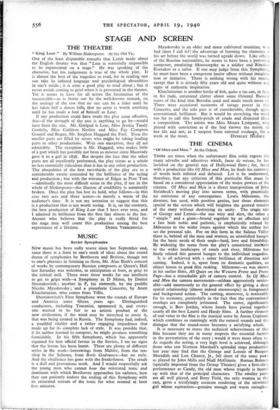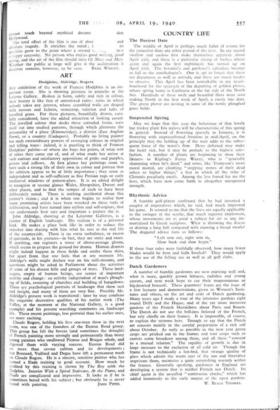THE CINEMA
"Of Mice and Men." At the Odeon.
THERE are times when the unfortunate film critic regrets the many adverbs and adjectives which, faute de mieux, he has lavished on the general run of Hollywood films ; for, faced with a production like Of Mice and Men, he finds his currency of words both inflated and debased. Let it be understood, therefore, that any criticism of this particular film must be based on a considered appreciation of the major powers of the cinema. Of Mice and Men is a direct transposition of John Steinbeck's moving play into screen terms, with practically no omissions of any consequence. Lewis Milestone, the director, has used, with positive genius, just those elements special to the screen which will heighten the general tension of the story without destroying its unity. The tragic tale of George and Lennie—the one wiry and alert, the other a " simple " and a giant—bound together by an affection and a fate both noble and pathetic, is emphatically related by Milestone to the wider issues against which the author has set the personal tale. For on this farm in the Salinas Valley there is, behind all the men and women, an unsatisfied hunger for the basic needs of their souls—land, love and friendship. By widening the scene from the play's constricted interiors to the wider landscapes of ranch and river, Milestone has finely related this general hunger to the individual tragedies.
It is all achieved with a sober brilliance of direction and cutting. Indeed, it is, apart from its dramatic qualities, an object lesson in good film making. Milestone—as was shown in his earlier films, All Quiet on the Western Front and Front Page—has a remarkable gift of camera control. In Of Mice and Men the camera movements—seldom aggressively notice- able—add enormously to the general effect by giving a deep spatial relationship (almost indeed stereoscopic) to foreground and background action. The cutting, moreover, is noticeable for its economy, particularly in the fact that the conventional overlaps are completely jettisoned. The cutter, significantly enough, is Bert Jordan, whose hands have pieced together nearly all the best Laurel and Hardy films. A further element of real value to the film is the musical score by Aaron Copland, which combines so cunningly witlithe natural sounds and the dialogue that the sound-score becomes a satisfying whole.
It is necessary to stress the technical achievements of this film because they are in many respects the essential factors in the presentation of the story ; would it were more often, so. As regards the acting, a very high level is achieved, although those who saw Norman Marshall's splendid stage production last year may find that the George and Lennie of Burgess Meredith and Lon Chaney, Jr., fall short of the same pass as played by John Mills and Niall McGinnis. Roman Bohnen (specially imported from the Group Theatre) gives a first-class performance as Candy, the old man whose tragedy is bound up with that of the principal characters. The' smaller parts are all well played, and Betty Field, the only woman in the cast, gives a terrifyingly accurate rendering of the nitwitted girl whose aspirations—genuine enough and warm enough-
cannot reach beyond mythical dreams den Hollywood.
The total effect of the film is one of abso: and absolute tragedy. It enriches the mind ; its
qualities grow to the point where a second ....0 run a happy necessity. No person who enjoys good writing, good acting, and the art of the film should miss Of Mice and Men. Whether the public at large will give it the acclamation it deserves remains, however, to be seen. BASIL WRIGHT.











































 Previous page
Previous page